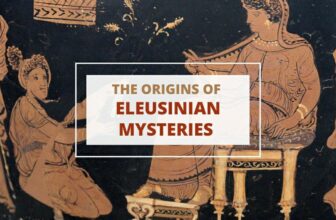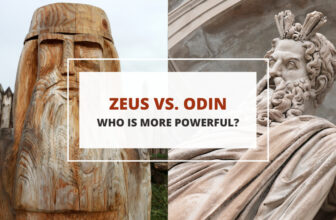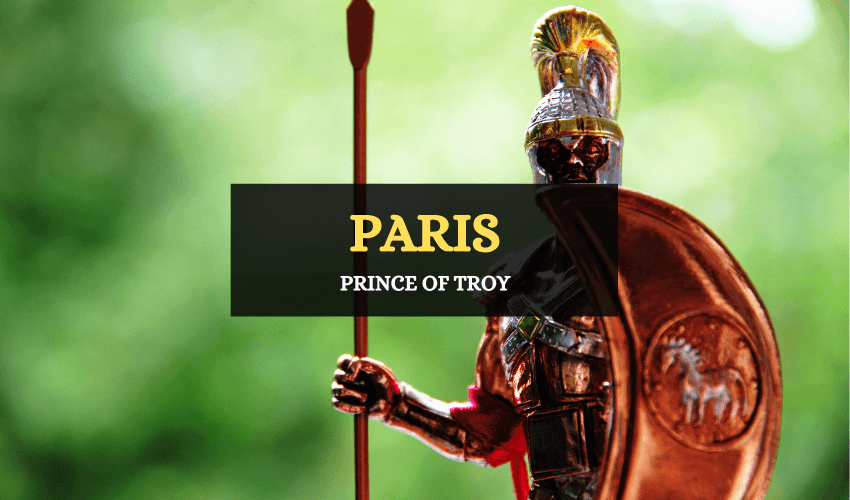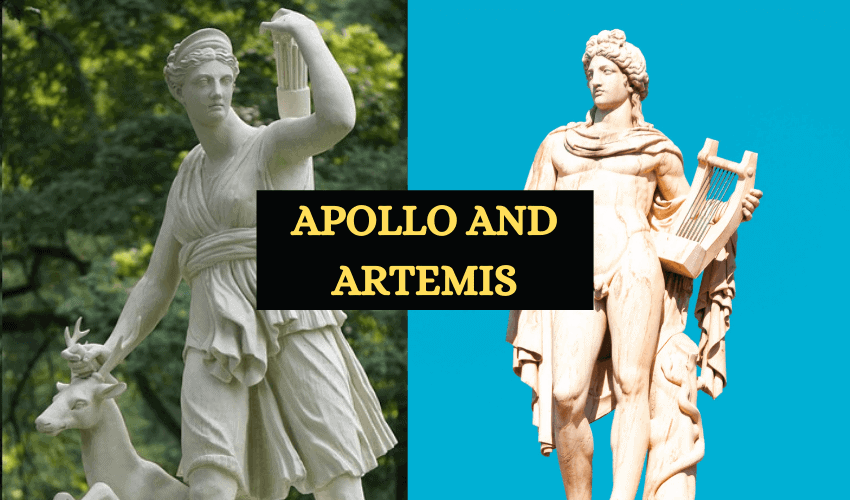
Table of Contents
In Greek mythology, Apollo and Artemis were brother and sister, the twin children of Zeus and Leto. They were highly skilled in hunting and archery and each had their own domain. They often enjoyed going hunting together and they both had the ability send plagues upon mortals. Both appeared in many myths together, and were important deities of the Greek pantheon.
The Origin of Apollo and Artemis
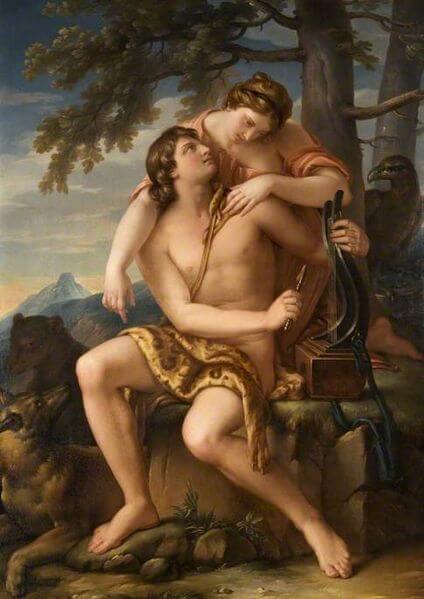
According to myth, Apollo and Artemis were born to Zeus, the god of thunder, and Leto, the Titan goddess of modesty and motherhood. After the Titanomachy, the ten-year war between the Titans and the Olympians, Zeus allowed Leto her freedom since she hadn’t taken any sides. Zeus was also captivated by her extreme beauty and seduced her. Soon, Leto was pregnant.
When Zeus’ jealous wife Hera found out about Leto’s pregnancy, she tried all she could to prevent Leto from giving birth. She forbade the land and water from giving sanctuary to Leto who had to travel across the ancient world, looking for a place to give birth to her child. Eventually, Leto came across the barren floating island of Delos which gave her sanctuary since it was neither land nor sea.
Once Leto was safely on Delos, she gave birth to a daughter who she named Artemis. However, Leto hadn’t known that she was pregnant with twins and soon, with Artemis’ help, another child was born. This time it was a son and he was named Apollo. According to various sources Artemis was born after Apollo, but in most stories she’s depicted as the firstborn child who also played the role of midwife for the birth of her brother.
Apollo and Artemis were very close and spent a lot of time in each other’s company. They loved their mother and took care of her, defending her when necessary. When Tityus, the giant, tried to rape Leto, the siblings rescued her by shooting arrows at the giant and killing him.
Artemis – The Goddess of the Hunt
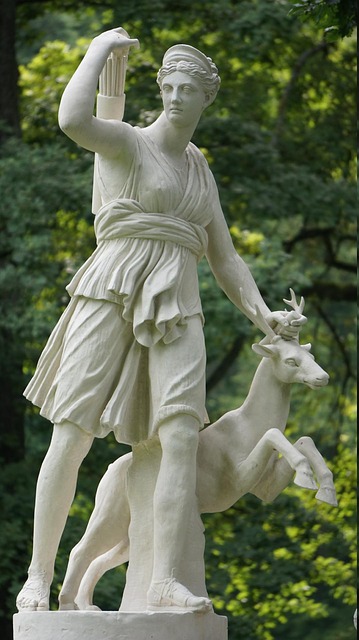
When Artemis grew up, she became the virgin goddess of hunting, wild animals and childbirth since it was she who had helped her mother deliver her brother. She was also highly skilled at archery and she and Apollo became the protectors of little children.
Artemis was much loved by her father, Zeus and when she was only three years old he asked her to name the gifts she wanted most in the world. She had a long list of gifts and among them were the following:
- To be a virgin for all eternity
- To live in the mountains
- To have all the mountains in the world as her playground and home
- To be given a bow and a set of arrows like her brother
Zeus gave Artemis everything on her list. He had the Cyclopes make a silver bow and a quiver full of arrows for his daughter and he promised that she would be a virgin forever. He made all the mountains her domain and gifted her 30 cities, naming her the guardian of all the harbors and roads in the world.
Artemis spent most of her time in the mountains and although she was the goddess of wild animals, she loved to hunt. She often went hunting with her mother and a giant hunter known as Orion.
Myths Featuring Artemis
Artemis was a kind and loving goddess but she could be fiery when mortals neglected to honor her.
Artemis Against Admetus
When her brother Apollo helped Admetus to win Alcestis’ hand in marriage, Admetus was supposed to make a sacrifice to Artemis on his wedding day but failed to do so. In anger, Artemis placed hundreds of snakes in the couple’s bedchamber. Admetus was terrified and sought help from Apollo who adviced him to make the sacrifices to Artemis as required.
Artemis Sends the Calydonian Boar
Another famous story featuring Artemis is that of the Calydonian King, Oeneus. Like Admetus, Oeneus offended the goddess by neglecting to offer the first fruits of his harvest to her. In retaliation, she sent the monstrous Calydonian boar to terrorize the entire kingdom. Oeneus had to seek help from some of the greatest heroes in Greek mythology to hunt down the boar and free his kingdom of it.
Artemis in the Trojan War
Artemis also played a role in the myth of the Trojan War. King Agamemnon of Mycenae had offended the goddess by boasting that his hunting skills were far greater than hers. To punish him, Artemis stranded his fleet by sending ill winds so that they couldn’t sail for Troy. Agamemnon sacrificed his daughter Iphigenia to appease the slighted goddess, but it was said that Artemis took pity on the girl at the last minute and spirited her away, placing a deer in her place on the altar.
Artemis is Molested
Although Artemis vowed to remain a virgin forever, she soon found that it was easier said than done. When the Titan Buphagus, son of Iapetus, tried to rape her, she shot him with her arrows and killed him. Once, Poseidon’s twin sons Otus and Ephialtes tried to violate Artemis and Hera. While Otus chased Artemis, Ephialtes went after Hera. Suddenly, a deer appeared and ran towards the brothers who tried to kill it with their spears, but it ran away and they accidentally stabbed and killed each other instead.
Apollo – God of the Sun
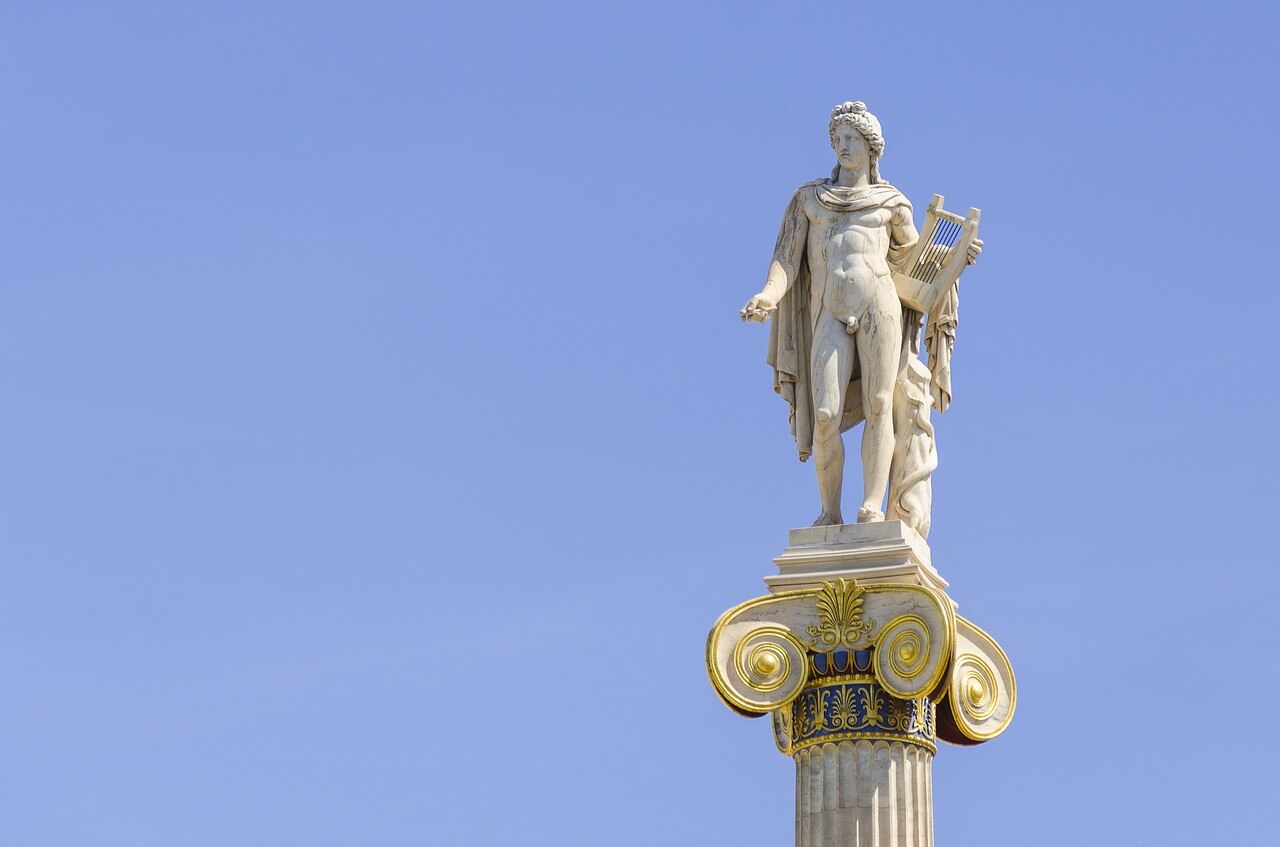
Like his sister, Apollo was an excellent archer and became known as the god of archery. He was also in charge of several other domains such as music, healing, youth and prophecy. When Apollo was four days old, he wanted a bow and some arrows which Hephaestus, the god of fire, made for him. As soon as he got the bow and arrows, he set off to find Python, the serpent that had tormented his mother. Python was seeking refuge in Delphi but Apollo chased him into a shrine of the Oracle of Mother Earth (Gaia) and killed the beast there.
Since Apollo had committed a crime by slaying Python in the shrine, he had to be purified for it after which he became skilled in the art of prophecy. According to some accounts it was Pan, the god of herds and flocks who taught Apollo this art. When he had mastered it, Apollo took over the Delphi Oracle and it became the Oracle of Apollo. Apollo became closely associated with prophecy and all seers from that point claimed to have been either fathered or taught by him.
Apollo was initially a herdsman and the first god in charge of protecting herds and flocks. Pan was associated with sheep and goats that grazed in wild and rural areas while Apollo was associated with cattle that grazed in the fields outside the city. Later on, he gave Hermes, the messenger god, this position in exchange for musical instruments that Hermes had created. Apollo excelled in music to the point where he became known as the god of art as well. Some even say that he invented the cithara (similar to the lyre).
Apollo played his lyre for all the gods who rejoiced when they heard his music. He was often accompanied by the Muses who sang to his tunes.
Myths Featuring Apollo
Every now and then, Apollo’s musical talents were challenged but those who did so never did it more than once.
Marsyas and Apollo
One myth tells of a satyr called Marsyas who found a flute that had been made from stag bones. This was a flute that the goddess Athena had made but had thrown away because she didn’t like the way her cheeks puffed out when she played it. Although she’d thrown it away, it still continued to play rapturous music inspired by the goddess.
When Marsyas played Athena’s flute, those who heard it compared his talents to that of Apollo, which infuriated the god. He challenged the satyr to a contest where the winner would be allowed to choose the punishment for the loser. Marsyas lost the contest, and Apollo skinned him alive and nailed the satyr’s skin to a tree.
Apollo and Daphne
Apollo never married but he did have several children with many different partners. However, one partner that stole his heart was Daphne the mountain nymph, who some sources say was a mortal. Although Apollo tried to woo her, Daphne refused him and transformed herself into a laurel tree to escape his advances, after which the laurel plant became Apollo’s sacred plant. This story became one of them most popular love stories in Greek mythology.
Apollo and Sinope
Another myth tells of how Apollo tried to pursue Sinope, who was also a nymph. However, Sinope tricked the god by agreeing to surrender herself to him only if he would grant her a wish first. Apollo swore that he would grant her any wish and she wished to remain a virgin for the rest of her days.
The Twins and Niobe
The twins played an important role in the myth of Niobe, a Theban queen and the daughter of Tantalus, who infuriated Leto with her bragging. Niobe was a boastful woman with many children and she always bragged of having more children than Leto. She also laughed at Leto’s children, saying that her own were far superior.
In some versions of this myth, Leto was outraged by Niobe’s boasting and called forth the twins to avenge her. Apollo and Artemis travelled to Thebes and while Apollo killed all of Niobe’s sons, Artemis killed all her daughters. They spared only one daughter, Chloris, for she had prayed to Leto.
In Brief
Apollo and Artemis were easily two of the most popular and well-loved deities of the Greek pantheon. Artemis was considered everyone’s favorite goddess among the rural populace whereas Apollo was said to have been the most loved of all Greek gods. While both deities were powerful, considerate and caring, they were also petty, vengeful and wrathful, lashing out against mortals who had slighted them in any way.



